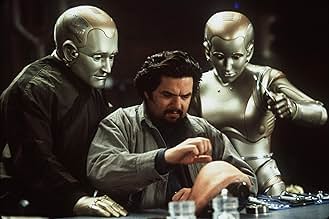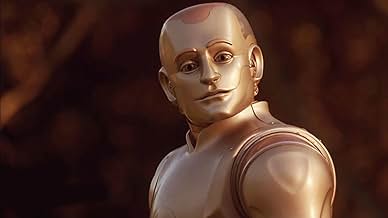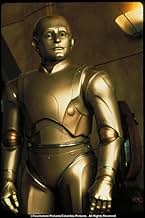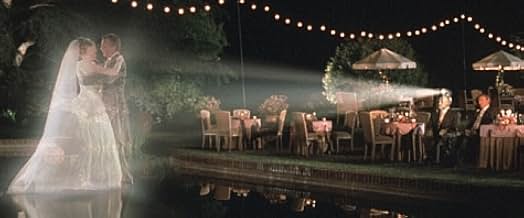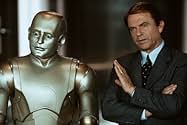Un androïde essaye de devenir humain au fur et à mesure qu'il acquiert des émotions.Un androïde essaye de devenir humain au fur et à mesure qu'il acquiert des émotions.Un androïde essaye de devenir humain au fur et à mesure qu'il acquiert des émotions.
- Nommé pour 1 oscar
- 2 victoires et 8 nominations au total
- Little Miss - 7 Yrs. Old
- (as Hallie Kate Eisenberg)
Histoire
Le saviez-vous
- AnecdotesAdam Bryant, who appears as the android head, has been Robin Williams' stand-in for more than a dozen films.
- GaffesThe final scene in which the nurse robot stops life support systems on request is invalid; the First Law of Robotics would have prevented it. No amount of begging would result in a positronic robot assisting in suicide or euthanasia. In fact, according to Asimov's stories, even witnessing a human being hurt might destroy a robot's positronic brain and the movie acknowledges the Three Laws of Robotics.
- Citations
Andrew Martin: May one, sir? Is now a good time?
'Ma'am' Martin: What? A good time for what?
Andrew Martin: Last night, Sir taught...
Sir: No, no, no, don't blame me Andrew. Just... go ahead.
Andrew Martin: Thank you sir
Andrew Martin: [Very fast] Two cannibals were eating a clown. One turns to the other and says "Does this taste funny to you?" How do you make a hanky dance? Put a little boogie in it! What is a brunette between two blondes? A translator! Do you know why blind people don't like to sky-dive? It scares their dogs! A man with demensia is driving on the freeway. His wife calls him on the mobile phone and says "Sweetheart, I heard there's someone driving the wrong way on the freeway." He says "One? There's hundreds!" What's silent and smells like worms? Bird farts. It must have been an engineer who designed the human body. Who else would put a waste processing plant next to a recreation area? A woman goes into a doctor's office, and the doctor says "Do you mind if I numb your breasts?" "Not at all." *makes 'motor-boating' noise. "Num-num-num-num."
Andrew Martin: [Family chuckles] One did it sir!
Sir: Andrew, it was fine, but we might want to talk about appropriatness and um, and timing.
Andrew Martin: It's ten-fifteen sir.
[Family laughs hysterically]
- Autres versionsFor Great Movies (a TV channel here in the UK)have certain lines and particular scenes cut. For example the line where Andrew mentions about breasts is cut along with the scene where he says can you fix this piece of shit,and finally the scene where Rupert and Andrew were talking about sex was shortened. However on Sky Cinema no scenes were harmed at all.
- ConnexionsEdited into Comic Relief Zero (2013)
- Bandes originalesThen You Look at Me
Music by James Horner
Lyrics by Will Jennings
Performed by Céline Dion
Produced by James Horner and Simon Franglen
Courtesy of SSO Music/Sony Music Entertainment (Canada) Inc.
The first section of the film is, by far, its weakest. In 2005, the wealthy Martin family receives delivery of a brand new servant android (Robin Williams) who, almost immediately, begins to display a remarkable range of human emotions and interests. Thus, we are set up for yet another in a long line of predictable tales (i.e. `Harry and the Hendersons,' `Stuart Little') in which a family comes to adopt a strange, not-quite-human creature, welcoming him in as one of their own. Indeed, in the film's early stages, there is no shortage of either bland humor or drippy sentimentality as Andrew, the android, ingratiates himself with all but one of the Martin household. The `wit' in the film consists, basically, of endless jokes about how Andrew takes all idioms at literal face value, a running gag that is, finally, as unoriginal as it is wearying.
Then, however, just as we are about to give up hope in it, the movie becomes more intriguing. Rather than staying within the context of the present life of this one family, the screenplay begins to move ahead in time, exploring Andrew's gradual growth toward total humanity, while the initial family grows up and eventually dies off. Actually, despite how one may feel about the film itself, one must admire its boldness and audacity, for it is not often that, in a film billed as a mass audience comedy, all the main characters pass on to their heavenly reward at one point or another but, then again, how many comedies span a two hundred year time period? `Bicentennial Man' obviously has more on its mind than mere fish-out-of-water buffoonery, as it becomes an often-elegiac reflection on the transience of life, the meaning of being human and the search for societal acceptance. The mood of the film is remarkably hushed and reflective at times, which again might make it slow going for the modern mass audience more conditioned to a faster pace and giddier tone, especially in a Robin Williams film (though, of late, his films have certainly been taking on a much more somber quality, vide `What Dreams may Come,' `Patch Adams' and `Jakob the Liar'). There are times when `Bicentennial Man' seems overly impressed with its own self-importance, yet one appreciates its refusal to settle for the easy path of cheap comedy and upbeat sentiments. There is, indeed, a real sadness to much of the film.
Special acknowledgement should be made of the superb art direction, set design, costume design, makeup and special effects that together give the film its understated and believable futuristic look. In addition, James Horner's melancholic symphonic score, though a bit lubricious at times, does create an atmosphere of contemplative seriousness that perfectly matches the tone and purpose of the film.
`Bicentennial Man' may not turn out to be what you are looking for when you first seek it out, but, if you approach it with an open mind and a certain degree of tolerance and indulgence, you may be pleasantly surprised and, perhaps, even rewarded.
- Buddy-51
- 24 juin 2000
- Lien permanent
Meilleurs choix
- How long is Bicentennial Man?Propulsé par Alexa
Détails
- Date de sortie
- Pays d’origine
- Langue
- Aussi connu sous le nom de
- Bicentennial Man
- Lieux de tournage
- sociétés de production
- Consultez plus de crédits d'entreprise sur IMDbPro
Box-office
- Budget
- 100 000 000 $ US (estimation)
- Brut – États-Unis et Canada
- 58 223 861 $ US
- Fin de semaine d'ouverture – États-Unis et Canada
- 8 234 926 $ US
- 19 déc. 1999
- Brut – à l'échelle mondiale
- 87 423 861 $ US
- Durée2 heures 12 minutes
- Couleur
- Mixage
- Rapport de forme
- 1.85 : 1
Contribuer à cette page




